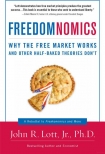Freedomnomics: Why the Free Market Works and Other Half-Baked Theories Don't John Jr. (the dot read aloud .txt) 📖

- Author: John Jr.
Book online «Freedomnomics: Why the Free Market Works and Other Half-Baked Theories Don't John Jr. (the dot read aloud .txt) 📖». Author John Jr.
Table of Contents
Praise
Title Page
Dedication
Introduction
Chapter 1 - Are You Getting Ripped Off?
Speculators, Price Gougers, and Other Good People
How Monopolies and Price Discrimination Help Save Lives
Why Are Dinners and Liquor So Expensive in Restaurants?
Why are Last-Minute Airline Tickets So Expensive?
Why Does the Price Spread Between Full and Self-Service Gas Vary?
Predatory Pricing—Not as Easy as it Seems
The Failure of Some Typical “Market Failure” Tales
Court Regulation: Good Intentions, Bad Results
Chapter 2 - Reputations
What Keeps Politicians and Businesses Honest?
Why Do People Donate Money to Political Campaigns?
Campaign Finance Reform
Why is Campaign Spending Increasing So Quickly?
The Myth of Double-Giving
Individual Reputations and Crime
Reputations: Keeping Corporations Honest
Chapter 3 - Government as Nirvana?
C’mon and Take a Free Ride
Diversified Stock Holding: A Free Market Approach to Keeping Corporate Peace
State Predators and Private Lambs
The Modern Guild System
Smoking Bans—Light ’Em Up
Chapter 4 - Crime and Punishment
Why did Crime Fall During the 1990s?
What Increased Crime? Part I
What Increased Crime? Part II
What Decreased Crime? Part I
What Decreased Crime? Part II
What Decreased Crime? Part III
What Didn’t Really Matter? Part I
What Didn’t Really Matter? Part II
The Verdict Is Still Out
A Few Odds and Ends about Crime
Chapter 5 - Voting Rights and Voting Wrongs
Women’s Suffrage and the Growth of Government
Suppressing Voter Turnout: The Poll Tax, Secret Ballots, and Literacy Tests
Voter Fraud
Voting Machines
The 2000 Florida Vote
Early Media Calls
Felon Voting
Is the Media Biased?
Government Control of Information: From Public Schools to Television
Parting Thoughts
Acknowledgements
Notes
Index
Copyright Page
MORE PRAISE FOR FREEDOMNOMICS
“Despite abundant evidence from around the world to the contrary, too many of our nation’s elites—including academics, journalists, politicians, and authors—claim that free enterprise does not work. Instead, they advocate increased government regulation and central planning. In Freedomnomics, John Lott dispels the myths and shatters such “conventional wisdom.” Based on fact, not ideology, he demonstrates how free market principles produce the greatest success, whether it involves business, labor, crime control, or public policy. This book is essential to those who seek to understand liberty.”
—Edwin Meese III, former U.S. attorney general under President Reagan
“Freedomnomics is a terrific exposition of matters pertaining to political economy—the interaction of politics and economics. Truly, this is a perspective that is enlightening and worthy of presentation. As Thomas Jefferson once uttered, ‘the price of freedom is eternal vigilance.’ John Lott has meaningfully contributed to the necessary vigilance toward the preservation of freedom with the tales of his professional journey.”
—John Raisian, Director and Senior Fellow, Hoover Institution, Stanford University
To Milton Friedman, not only among the greatest economists of all time, but also
the heroic, often lone champion who fought for freedom with
gusto and a smile on his face. He helped many understand
how freedom makes us better off.
Introduction
It is not from the benevolence of the butcher, the brewer, or the baker, that we expect our dinner, but from their regard to their own interest. We address ourselves, not to their humanity but to their self-love, and never talk to them of our necessities but of their advantages.
—Adam Smith, The Wealth of Nations1
The free market works. This notion was clear to Adam Smith in the early days of capitalism, but since then it has come under a great deal of skepticism. These criticisms are nothing new, of course. As far back as 1848, Karl Marx published a Communist Manifesto, advocating an alternative economic system that would replace the market with state planning. Communism was adopted in countries ranging from Russia to North Korea, but somehow the outcome was always the same—mass shortages. Most Communist regimes eventually scrapped their dysfunctional economic system, if their populations didn’t rise up and do it for them. Today, there are only a few remaining Communist countries, and the only ones that have any kind of economic success—like China—are the ones that are reestablishing free enterprise.
Meanwhile, countries that stuck with the free market have prospered. There is a simple reason for this—as Smith observed, the free market is based on the pursuit of economic self-interest. The market acknowledges that people’s behavior is largely determined by incentives, whether in the form of carrots or sticks. Allowing people the freedom to improve their own economic condition helps to make society wealthier overall. Smith understood that free trade takes place because both parties in an exchange profit from it. Whether a person buys a new car, a computer, or a movie ticket, the customer values the good he purchases more than the money that he pays for it. The seller, for his part, values the money that he receives more than the product.
Yet, despite its proven success, a profound distrust of the free market has spread even among the citizens and governing elites of wealthy, free nations. In the United States, politicians convene hearings to rail against oil companies, accusing them of ripping off consumers and insisting on the need for price controls or higher taxes on the firms’ profits. Newspapers denounce “corporate greed,” arguing that the only thing keeping any big company from turning into another Enron is the watchful eye of government regulation. The general public grumbles that high medicine prices mean that drug companies are getting rich at their expense.
As a telling example of the prominence of this view, the book Freakonomics achieved phenomenal popularity, selling over a million copies. In it, authors Steve Levitt and Stephen Dubner purport to unveil the “obfuscation, complication, and downright deceit” that pervades our everyday life.2 Naturally, suspicion of corporations is a paramount theme. But the authors’ misgivings go much further. They see experts such as doctors, funeral directors, and life insurance agents as unscrupulous sharks looking to cash in on their expertise by swindling their own clients. “If you were to assume that many experts use their information to your detriment, you’d be right,” they warn. 3 The pair even compare real estate agents to members of the Ku Klux Klan. In their world, almost everyone—from teachers to Sumo wrestlers to politicians—is cheating or lying to somebody. Whether it is Levitt and Dubner or Michael





Comments (0)